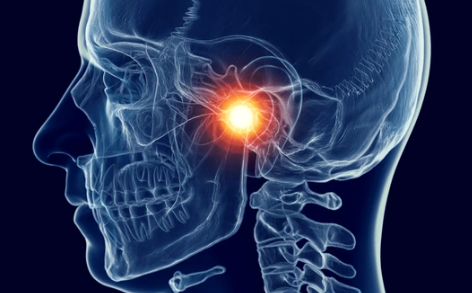Sachar Dental NYC
For SAME day / emergency appointments
Call (212) 752-1163
All the below content has been written by NYC Dentist, Dr. Sandip Sachar.
Why Did I Suddenly Get TMJ?
The sudden onset of jaw pain, clicking, or limited mouth movement can be both startling and debilitating. For many patients, it raises an urgent question: “Why did I suddenly get TMJ?”
First, some clarification: TMJ stands for the temporomandibular joint - the hinge connecting your jaw to your skull. TMD (temporomandibular disorder) refers to problems affecting this joint and the surrounding muscles. While it may feel like TMD develops overnight, it often results from a combination of stress, lifestyle, health conditions, and dental habits that build up until a “triggering event” sets symptoms in motion.
As TMJ specialists in NYC, we’ve seen a steady rise in patients seeking relief from sudden jaw discomfort. Living in a fast-paced, high-pressure city like New York -- with long commutes, tech-driven jobs, and high stress levels — can amplify risk factors, making it more common for symptoms to appear abruptly.

Why TMD Seems to Come “Out of Nowhere”
Many patients describe their symptoms as sudden — but in reality, there are often subtle precursors that go unnoticed until something triggers pain or dysfunction. A stressful week, chewing something unusually tough, or even an awkward night’s sleep can act as the tipping point.
Here are some of the most common reasons TMD can feel like it appears suddenly:
1. Acute Trauma to the Jaw
-
Biting into a hard food
-
A sports injury or whiplash from an accident
-
Prolonged mouth opening during dental work
-
Sleeping in an awkward position that places pressure on the jaw
These incidents can strain the joint, displace the cushioning disc, or trigger inflammation.
2. Stress & Teeth Grinding (Bruxism)
Stress-related clenching and grinding -- often during sleep -- is one of the leading causes of sudden TMD symptoms. Constant pressure wears down the joint and muscles until pain or stiffness surfaces.
In a high-pressure environment like NYC, elevated cortisol levels can make clenching and grinding more common, particularly during stressful work or school periods.
3. Posture Problems & “Tech Neck”
Hours spent hunched over laptops, smartphones, or trading desks can alter posture, straining neck and jaw muscles. Over time, this imbalance affects the temporomandibular joint, sometimes triggering pain after just one long day of poor posture.
4. Dental Work & Bite Changes
-
Long dental procedures that require extended mouth opening
-
Recent orthodontic adjustments
-
Changes in bite alignment (occlusion)
These can stress an already vulnerable jaw joint and spark symptoms.
5. Hormonal & Medical Conditions
-
Hormonal fluctuations (particularly estrogen) may affect joint health, which could explain why women aged 20–40 are disproportionately affected.
-
Autoimmune conditions such as rheumatoid arthritis, lupus, or fibromyalgia may show up in the TMJ before other joints.
6. Infections & Inflammation
Though rare, sinus infections, ear infections, or dental abscesses can inflame the joint area, leading to pain and stiffness.
7. Sleep Disorders & Airway Issues
Conditions such as sleep apnea may cause unconscious jaw repositioning to keep the airway open. Over time, this extra strain can trigger TMD symptoms.
Diagnosing TMD: Why You Need a Professional Evaluation
Jaw pain doesn’t always mean TMD. It can also stem from:
-
Ear infections
-
Sinus problems
-
Dental malocclusion
-
Nerve-related pain
That’s why a comprehensive dental evaluation by a TMJ specialist is essential. At Sachar Dental NYC, diagnosis may include:
-
Medical & dental history
-
Physical exam of the jaw, head, and neck
-
Bite analysis
-
Imaging (digital X-rays or CBCT scans)
This approach ensures treatment targets the root cause -- not just the symptoms.
Treatment Options for Sudden-Onset TMD
The good news: most cases respond well to conservative, non-invasive treatments.
-
Nightguards or Splints – Custom appliances that protect teeth from grinding and reduce joint pressure.
-
Physical Therapy – Jaw exercises that improve mobility and ease tension.
-
Stress Management – Meditation, CBT, or biofeedback to reduce clenching habits.
-
Medication – Anti-inflammatories or muscle relaxants for short-term relief.
-
Advanced Therapies – For persistent cases, Botox injections, trigger-point therapy, or minimally invasive surgery may be considered.
Red Flags: When to Seek Immediate Help
Call a dentist right away if you experience:
-
Jaw locking (open or closed)
-
Severe pain or swelling
-
Sudden changes in bite
-
Ringing in the ears or hearing loss
-
Neurological symptoms such as facial numbness
FAQs About Sudden TMJ/TMD
Can TMJ go away on its own?
Mild cases sometimes improve with rest, stress reduction, and posture correction. But if symptoms persist, professional care is recommended to prevent chronic issues. (NIDCR)
Why is TMJ more common in women?
Hormonal factors, especially estrogen’s influence on joint sensitivity, may play a role.
Can stress really cause TMJ?
Yes. Stress contributes to teeth clenching and grinding, which places significant strain on the temporomandibular joint.
Final Thoughts
The phrase “I suddenly got TMJ” reflects how alarming jaw pain can feel -- but most cases are the result of long-standing stressors reaching a tipping point. Whether caused by posture, stress, bite changes, or medical conditions, the key is early diagnosis and treatment.
At Sachar Dental NYC, our highly skilled and experienced TMJ specialists focus on uncovering the underlying causes to stop the cycle and restore comfort.
Sachar Dental is located in Midtown Manhattan, NYC -- schedule your consultation today!
Read MORE about TMJ (Temporomandibular Joint Disorder) on our services page.
Sachar Dental NYC
20 East 46th Street
Rm 1301
(Between 5th Ave & Madison Ave)
New York, NY 10017
212-752-1163
https://www.sachardental.com/
drsachar@sachardental.com